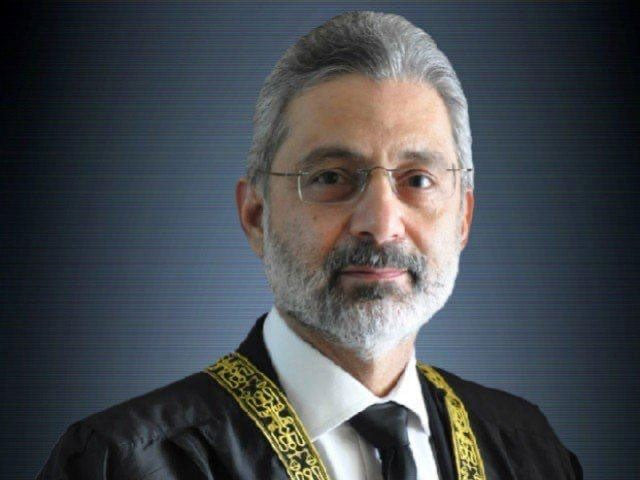Justice Isa’s suo motu order recalled
6-judge SC bench says order ‘clearly violative’ of an August 2021 order

A six-member Supreme Court bench on Tuesday recalled the interim order authored by Justice Qazi Faez Isa, wherein postponement of suo motu cases was ordered till amendments were made in the SC Rules, 1980 regarding the discretionary powers of the chief justice to form benches.
On March 29, a three-member bench heard the same case during which Justice Qazi Faez Isa and Justice Aminuddin Khan had ruled that the chief justice of Pakistan (CJP) did not have the power to make special benches or decide its members.
The apex court judges had said that all hearings based on suo motu notices and cases of constitutional significance — under Article 184(3) — should be postponed until they were legislated upon.
However, Justice Shahid Waheed, the third member of the bench, had dissented from the verdict in his minority ruling, saying that judges could not raise objections regarding the constitution of benches because if they did so they would become a complainant and it would no longer be appropriate for them to hear the case.
The larger bench, headed by Justice Ijazul Ahsan and comprising Justice Munib Akhtar, Justice Sayyed Mazahar Ali Akbar Naqvi, Justice Muhammad Ali Mazhar, Justice Ayesha A Malik and Justice Syed Hasan Azhar Rizvi, heard the case.
The bench disposed of the suo motu proceedings which were earlier heard by a bench led by Justice Isa while examining the regulation about a grant of 20 additional marks to a Hafiz-e-Quran student while admitting them for an MBBS/BDS degree.
During Tuesday’s hearing — which lasted for a total of five minutes — the PMDC counsel, Afnan Kundi, contended that 20 additional marks were awarded to students for memorising the Holy Quran up until 2018.
“New rules were formulated in 2021 and the process of awarding additional marks was brought to an end,” Kundi said.
Subsequently, the court disposed of the case on account of it being “ineffective”.
Also read: SC disregards 2-judge verdict deferring suo motu cases
The detailed court order stated that Justice Isa and Justice Aminuddin’s order was “clearly violative” of a five-member bench’s August 2021 order that only the chief justice could take suo motu notice.
“The majority order also appears to be in violation of the well settled rule of law, which is axiomatic, that the chief justice is the master of the roster. The order was therefore both without and beyond jurisdiction. Therefore, we are respectfully of the view that the order dated 15.03.2023 passed by two honourable members of the bench was inoperative and ineffective when made, was such at all times thereafter and continues to remain so.”
The detailed court verdict also agreed with the chief justice’s observations in the registrar’s circular.
“On perusal of the circular in question, we are of the view that the observations made by the honourable chief justice of Pakistan are unexceptionable and simply rectify an unwarranted assumption of jurisdiction and intrusion into, and interference with, powers that the principles laid down in the case law place firmly in the hands of the Chief Justice alone.
“We accordingly affirm the observations of the HCJP as incorporated in the circular and the directions issued therein. In view of the foregoing, the interim order dated 15.03.2023 (released on 29.03.2023) is recalled,” the order read.
Regarding the case itself, the order said that since the Pakistan Medical and Dental Council (PMDC) had informed that the MBBS and BDS (Admissions, Examinations, House Job or Internship) Regulations, 2018 which granted the 20 additional marks were not in force and the current regulations did not allow any such marks so “no further proceedings in this suo motu case are required”.
“The SMC is accordingly disposed of as having been infructuous. File may be consigned to the record.”
Justice Munib Akhtar also said that the suo motu case has become infructuous after an amendment in the PMDC regulation. The bench held that the suo motu proceedings were closed after an amendment in the PMDC regulation.



















COMMENTS
Comments are moderated and generally will be posted if they are on-topic and not abusive.
For more information, please see our Comments FAQ